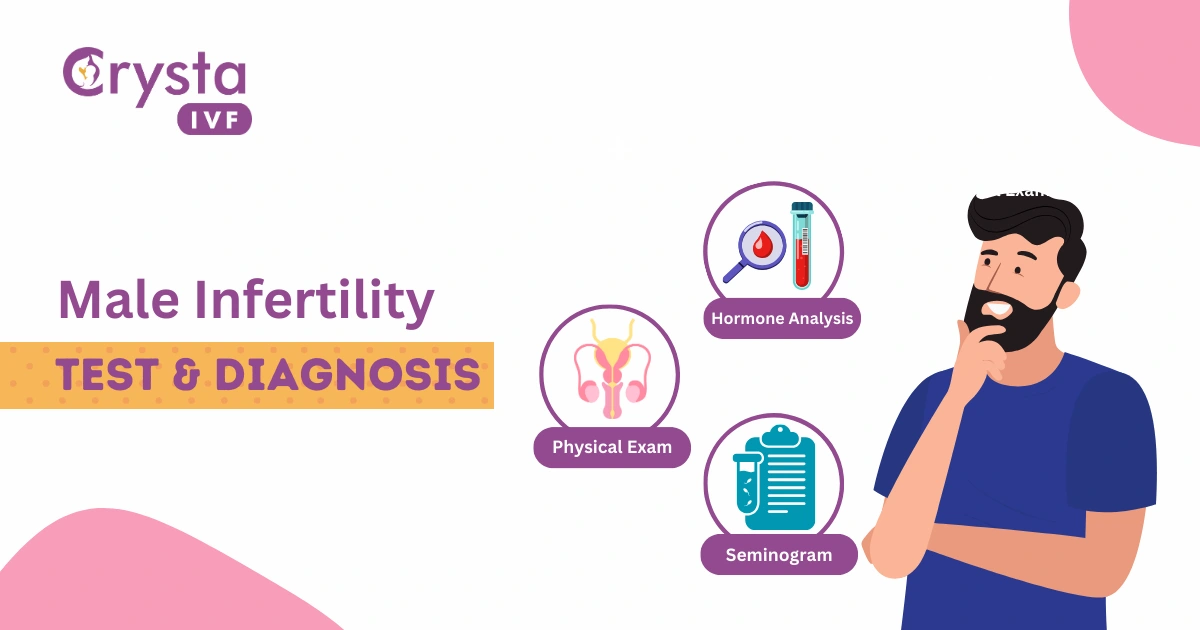Fertility is crucial for any couple, and it’s not solely the responsibility of women to ensure successful conception. Male fertility plays an equally important role in the process. Therefore, if you and your partner are trying to conceive, you want to know why you are facing failure in the conceiving process or looking out for your reproductive health. Male Fertility Tests can help you make a firm decision and give you valuable insights.
The test offers valuable insights while providing hope for many couples on their parenthood journey. Hence, this blog carries all the vital information on how a male fertility test can help you overcome your fertility challenges on time. But before we proceed further, let’s shed some light on the importance of fertility test for male and how they can change your life.
Why are fertility tests for men important?
Tests for male fertility are essential because they help identify potential issues that may complicate your conception. As fertility challenges affect male and female, they should be checked in the initial stage! By undergoing these male fertility tests, men can:
Determine the fertility issues: Male fertility tests provide an overview of a male’s reproductive health, helping to identify potential causes or concerns
Plan for the future: If you are planning to conceive and start a new chapter of your life, knowing your fertility status can help you to make informed decisions about family planning.
Rule out underlying conditions: Some fertility issues can result from underlying medical conditions, such as hormonal imbalances or infections. And early detection helps you to get a timely treatment.
Improve health and lifestyle: Research says that, in some cases, dietary adjustments, lifestyle changes, or medical treatments can enhance male fertility. And knowing your fertility status can help you make certain lifestyle changes.
Now, after recognizing the importance of fertility tests for men and connecting to the fertility clinic in Kanpur at the right time, let’s understand who needs male fertility tests the most.
Signs and symptoms of male infertility
Generally, male fertility problems can often go undiagnosed and untreated for various reasons, such as believing that infertility is a female problem and male infertility doesn’t exist.
However, there may not be any obvious symptoms of male infertility other than being unable to conceive with your female partner. Still, the common male infertility symptoms identified are:
- Challenges related to sexual function, such as issues with ejaculation leading to minimal fluid discharge, diminished sexual desire, or the struggle to sustain an erection (erectile dysfunction).
- Inability to smell
- Recurrent respiratory infections
- Lower than normal sperm count
- Abnormal breast growth
- Pain, swelling, or lump in the testicle area

Other than looking over your signs and symptoms, male infertility is also diagnosed by examining these:
- The length of time the individual has been experiencing infertility
- The onset and progression of puberty
- Any urological conditions or surgeries during childhood.
- A record of acute or chronic medical ailments.
- A detailed sexual history.
- Any history of testicular cancer and the treatments received
- Medications are currently being taken.
- Any spinal cord injuries or related conditions.
Did you find yourself positive for the male fertility test? And I’m wondering what conditions led you to this tormented phase of your life. If yes, don’t get discouraged; we will cover those causes that lead to male infertility.
You Can Also Read
Zero Sperm count
Causes of male infertility
Abnormal sperm production or function
Irregular sperm production or functionality can result from various factors, including undescended testicles, genetic abnormalities, medical conditions like diabetes, and infections like chlamydia, gonorrhea, mumps, or HIV. Additionally, swollen veins in the testes, known as varicoceles, can impact sperm quality.
Problems with the delivery of sperm
Issues related to sperm delivery can arise from various factors, including sexual difficulties like premature ejaculation, specific genetic conditions like cystic fibrosis, and structural obstructions like testicular blockages or injuries to the reproductive organs.
Overexposure to certain environmental factors
Overexposure to certain pesticides and other chemicals, such as radiation, cigarette smoking, alcohol, marijuana, anabolic steroids, specific medications, high blood pressure, and depression, can also affect fertility. Not only that, frequent exposure to heat, like saunas or hot tubs, can also raise the risk of excess heat on your body and may affect your sperm production.
Your sperm can also get damaged due to cancer and its treatment, including radiation or chemotherapy. If you have had cancer and you undergone the treatment, you might have impaired sperm production that can trouble the male fertility.
Studying symptoms causes and how you can diagnose them serves its ultimate purpose only when you reach out for male fertility tests on time.
Type of Male fertility test
There are various fertility tests for males that come with their purpose and advantages. Some of the most common ones are:
Hormone Testing
Hormone tests measure the level of specific hormones like testosterone, follicle-stimulating hormone (FSH), and luteinizing hormone (LH). An imbalance of hormones can affect your sperm production and overall reproductive health.
Semen Analysis
Semen analysis is the cornerstone of the male fertility test. It involves collecting a semen sample and examining it for various parameters, including sperm count, motility (movement), morphology (shape), and volume. Abnormality or trouble in semen analysis cases can lead to male infertility.
Physical examination
The physical examination will be performed to examine and check for any anatomical abnormalities such as varicoceles (enlarged veins in the scrotum) or other physical issues that may affect your fertility.
Genetic testing
Genetic testing aids in identifying inherited conditions or genetic factors that lead to male infertility. Conditions like Klinefelter syndrome or Y-chromosome can be detected through genetic testing.
Sperm DNA fragmentation test
The sperm DNA fragmentation test checks for the integrity of sperm DNA. If elevated DNA fragmentation levels are found, they can affect sperm quality and fertilization potential.
Anti-sperm antibody test
The anti-sperm antibody test determines whether the immune system produces antibodies that attack and impair sperm function or not.
Post-ejaculatory urinalysis
This test checks if sperm enters the bladder during ejaculation, a sign of retrograde ejaculation.
Scrotal ultrasound
An ultrasound of the scrotum helps to monitor the issues like varicoceles, cysts, or tumors that may affect your fertility.
So, is there a right time to undergo fertility tests for men? Absolutely! Your fertility should be checked when you are ready to take significant steps to start a new chapter in your life and prioritize your reproductive health.
When is the right time to consider male fertility testing?

Couples trying to conceive: If you are trying to conceive with your female partners and have not found any positive result, it is advisable to undergo a fertility test.
Family planning: Even if you’re not actively trying to conceive, knowing your fertility status can help for future family planning decisions and look out for fertility treatments.
Known health issues: Men with chronic health issues that could impact their fertility, such as diabetes, thyroid disorders, or previous testicular injuries, may consider testing earlier.
Before Assisted Reproductive Techniques: Fertility treatments like in-vitro fertilization (IVF) and male fertility tests can help improve your chances of conception with your female partner while reducing the challenges.
Conclusion
Male fertility testing is a valuable way of assessing reproductive health and identifying potential issues affecting fertility. These tests can provide crucial information for couples trying to conceive and help men make informed decisions about their reproductive future. If you have concerns about your fertility or are actively trying to start a family, consult with a top fertility expert at Crysta IVF to discuss the appropriate tests and steps to take. Remember that early detection and intervention can often lead to improved fertility outcomes. So stay positive and take a step forward to plan a healthy family.





Would love to perpetually get updated outstanding web blog! .
Thank you. Glad you found this blog post helpful. Stay tuned for more informative blogs.